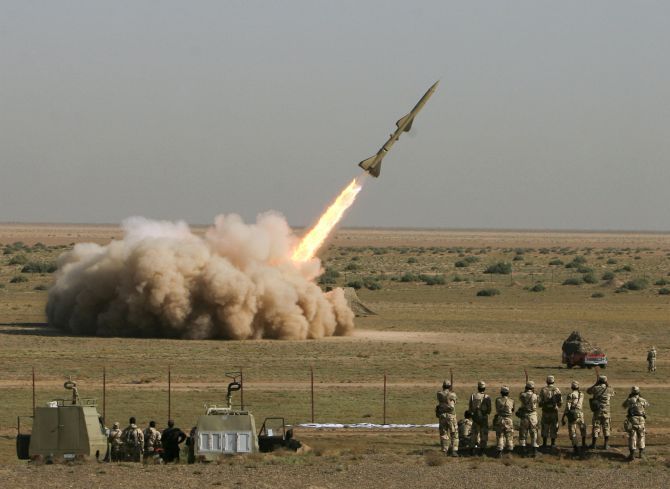 Negotiating a sustainable compromise with Iran is not getting any easier, and this delay might not yield the desired result of bringing Tehran’s nuclear programme under stringent limits, says Claude Smadja
Negotiating a sustainable compromise with Iran is not getting any easier, and this delay might not yield the desired result of bringing Tehran’s nuclear programme under stringent limits, says Claude Smadja
Surprise, surprise! The November 24 deadline for completing a deal to put a brake on Iran's nuclear programme could not be met, and now the deadline to reach a broad political agreement has been extended to March 1, 2015, with all the modalities for a comprehensive deal to be set by July 2015.
It was obvious since quite some time that the gap between Iran on one side and the United States and Europe plus China and Russia on the other side could not be bridged on crucial issues, such as the level of uranium enrichment Tehran would be allowed to pursue or the number of centrifuges it would be able to keep, given the fact that the number of these centrifuges has increased 60 times over the last 10 years. Another major unresolved divergence was on the sequencing of events between the two sides: for the United States and the Europeans there had to be major -- and verifiable -- reductions of the scope of Iran's nuclear programme before a significant and gradual reduction of economic sanctions would take place. And for Tehran it had to be the reverse.
From the moment the interim agreement was concluded in Geneva in November 2013, it was obvious that President Hassan Rouhani and Foreign Minister Javad Zarif were operating under a very tight leash, with no real negotiating leeway. The western media had been prompt at the time to praise the election of Rouhani as a shift in Tehran towards reformist elements keen to achieve an improvement of relations with the United States and the western world in general. This was ignoring the fact that the reality of power had not changed one ounce, remaining in the sole hands of Ayatollah Ali Khamenei, supported by a very strong and vocal constellation of hard-line groups -- comprising, for instance, the Revolutionary Guards and their powerful leader Mohammad Ali Jafari. The domain where President Rouhani has been able to have an impact has been in improving the economic situation -- basically by putting an end to the nonsensical policies of his predecessor Mahmoud Ahmadinejad. Paradoxically, this might make an agreement more difficult to achieve as this has, in fact, increased the ability of Iran to sustain the hardships created by the sanctions.
So the real question now is whether the extension of the deadline for concluding the negotiations has any chance of achieving the desired result -- bringing Iran's nuclear programme under such stringent limits and controls that it would take Tehran at least a year to have the means to build a nuclear weapon should it decide to break out from the deal. The worst outcome would be for an agreement that would end up providing comfortable cover for Iran to pursue most of its ambitions. In that respect, it is worth keeping in mind that Tehran continues to refuse to allow the International Atomic Energy Agency to conduct inspections on its Parchin nuclear site, where nuclear warheads research is suspected of being conducted. And concerns about Iran continuing to develop its nuclear programme at covert, undetected sites have been a permanent thread line in the approach of the American and European negotiators.
Beyond the extremely complex technical issues that need to be addressed to make an agreement viable, whether the extension of the deadline for concluding the negotiations will prove useful or not depends basically on three factors:
First, the regime in Tehran and presumably a very large segment of the Iranian people consider that Iran is ‘entitled’ as a significant regional power to be able to build a nuclear capability that will be its insurance policy. In addition to that, the ability to pursue a nuclear programme has now become a matter of "honour" for the regime and its supporters. This factor adds to the difficulty of getting from Tehran the kind of concessions that are needed to achieve a deal acceptable by the Americans and the Europeans.
Second, whether an agreement on the nuclear issue is achieved or not, we can take it for granted that as long as the present configuration of power will exist in Tehran enmity -- if not hatred -- towards the United States and Israel will continue to be a key element of the regime's DNA. So even if an acceptable nuclear deal can be reached, it would certainly be misleading to consider it as the milestone for a normalisation of United States-Iranian relations in the way Americans define the normalisation of relations between two countries. And such an agreement will definitely not be a stepping stone contributing to the resolution of the Israeli-Palestinian conflict. A salutary dose of realism is needed here to put such a deal -- if it were to be concluded -- in its right context.
Third, it will be crucial that the European and American negotiators resist the very common temptation in this kind of circumstances of reaching an agreement for the sake of having an agreement to bring back home. This is even more relevant considering how much the Barack Obama administration is desperate for any diplomatic success given its dismal foreign policy record. In addition to that, it will certainly be crucial to bring Saudi Arabia and Israel "in"; their buy-in will be needed not just to ensure that any agreement is viable but also so that tensions and volatility in West Asia are not aggravated.
The Iranian regime's strategic priority is -- and will remain -- to preserve as much as possible of its capacity to build a nuclear capability while loosening as much as possible the sanctions that have hurt its economy. The red line that it will not cross is acquiescing to such tight limits to its nuclear programme that it would mean a de facto renouncement of its nuclear ambitions -- and this, whatever the cost might be in terms of a prolongation and extension of sanctions if a Republican-controlled Congress in Washington gets restless. On the other side, President Obama knows that any deal that would not translate into a steep reduction in the number and capacity of Iranian centrifuges, and with very strict enforcement and verification requirements, will be killed by the United States Congress.
It is not sure that the additional months given for the negotiation to succeed will permit the discovery of any sustainable compromise between the strategic objectives of Iran and of the United States and Europe, which remain fundamentally at odds. And here, the key operating word is "sustainable", since the lingering perception is that even if an agreement can be reached, it will still remain a transitory one as long as the nature of the regime in Tehran does not change. There are limits to what constructive ambiguity involved in diplomacy can achieve. And these limits will be very severely tested in the coming months.
Claude Smadja is president of Smadja & Smadja, a strategic advisory firm.












 © 2025
© 2025